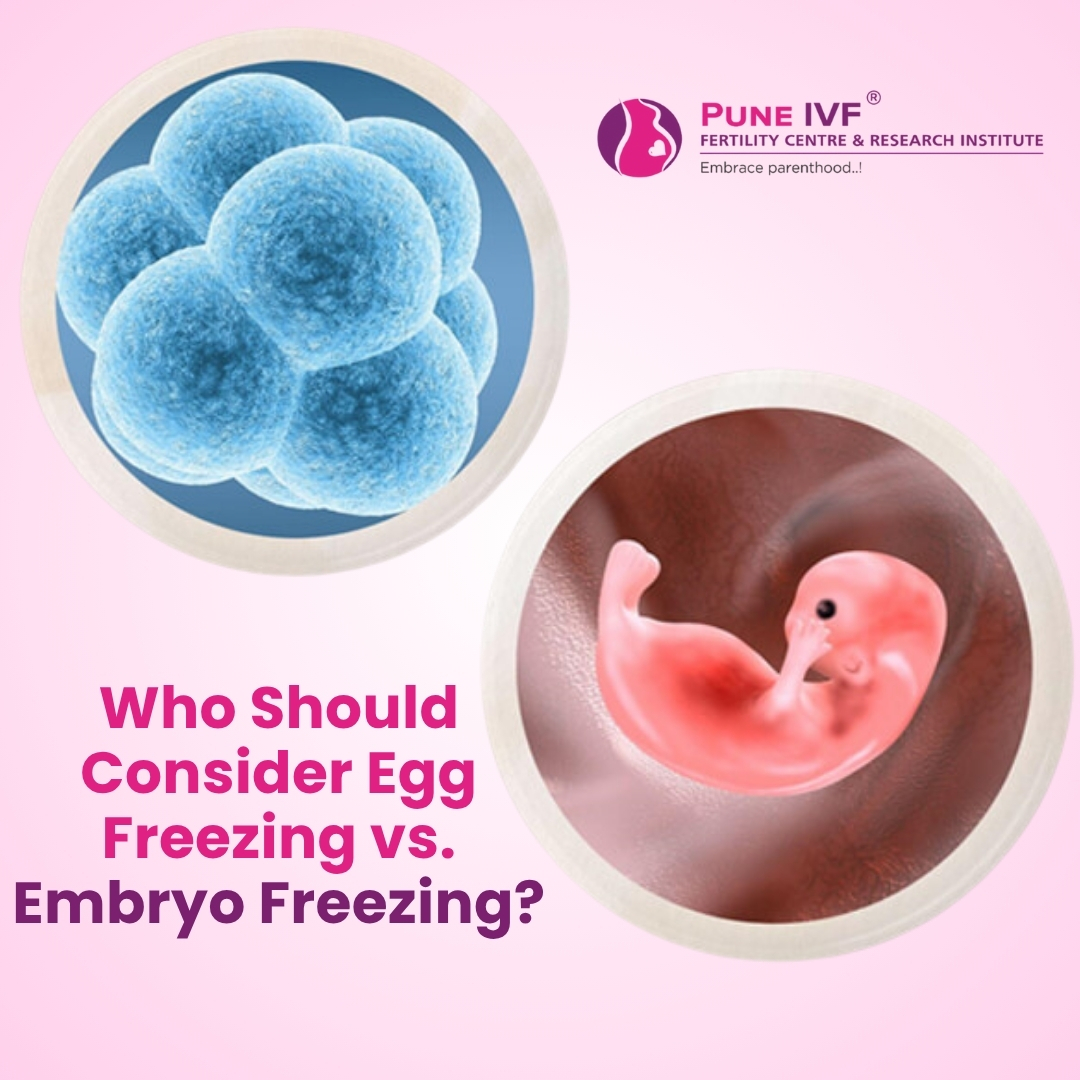Who Should Consider Egg Freezing vs. Embryo Freezing?
– Published on 25 APRIL 2024

Choosing between freezing your eggs (oocyte cryopreservation) and freezing embryos (embryo cryopreservation) is a major decision in family planning. This guide will help you understand both options—how they differ, when each makes sense, and which factors should steer your choice.
What’s the difference?
- Egg freezing involves retrieving unfertilized eggs from the ovaries, freezing them, and storing them until you are ready to fertilize and implant later.
- Embryo freezing means the eggs are retrieved, fertilized (using sperm from a partner or donor) to form embryos, and then those embryos are frozen and stored.
- Because the processes diverge at the fertilization step, the decision often comes down to your current relationship status, future family-planning intentions, cost, ethical/legal factors, and how sure you are of your partner or donor situation.
When egg freezing may be the better option
Consider egg freezing if one or more of the following applies:
- You are single or not yet ready to commit to a partner for co-parenting, but you want to preserve fertility now. Freezing eggs gives you flexibility
- You want to delay childbearing for reasons such as career, travel, education, or other personal goals—but you wish to preserve younger, healthier eggs now.
- You prefer to postpone decisions about whose sperm will be used (partner vs donor) or what embryo scenario will look like. Eggs allow you to defer those choices.
- You have a medical reason (for example upcoming chemotherapy, radiotherapy, or another fertility‐threatening treatment) and wish to preserve fertility when time is short.
Pros for egg freezing:
- More autonomy and flexibility.
- Fewer immediate decisions needed about sperm/partner.
- Typically, lower upfront cost because fertilization and embryo culture steps are postponed.
Things to keep in mind:
- While survival and success rates have improved with vitrification, each frozen egg still needs to be fertilized and then implanted, so there’s a chain of steps before pregnancy.
- If you have a partner and intend to conceive together soon, embryo freezing may offer somewhat higher certainty of what you’re freezing (since fertilization has already occurred).
When embryo freezing may be the better option
Embryo freezing might be suitable if you are in a committed relationship (or using donor sperm), and you’re fairly certain you’ll be working with that partner/donor for future parenthood. Some key scenarios:
- You and your partner are ready (or nearly ready) to plan children together in the future, and you want to maximize the chance of success by freezing embryos now.
- You want to know ahead of time how many embryos you have (after fertilization) rather than just freezing eggs and waiting to see how many ultimately form. Embryo freezing gives more upfront information about embryo quality.
- You are comfortable with the ethical, legal and partner-related implications of creating embryos now (e.g., what happens if the partner changes their mind, or you separate).
Pros for embryo freezing:
- Embryos may have slightly higher survival and success rates after thawing compared to eggs alone (though the gap has narrowed with advanced freezing techniques).
- Since fertilization is done upfront, the amount of work remaining when you’re ready to use them may be less.
Things to keep in mind:
- Requires sperm (partner or donor) at the time of freezing.
- Upfront cost is higher (because of fertilization, embryo culture, possibly genetic testing) compared to egg freezing alone.
- Legal, ethical and emotional considerations around frozen embryos are more complex (for example, what happens to embryos if the couple separates).
Key factors to consider when comparing options
- Age and ovarian reserve
Your age at the time of retrieval has a strong influence on egg/embryo quality. Younger age usually means better outcomes. Whether freezing eggs or embryos, earlier is generally better. - Relationship status & future parenting plan
If you have a stable partner and plan to conceive together, embryo freezing may make more sense. If you are single, uncertain about a partner, or prefer to keep options open, egg freezing is a valuable form of insurance. - Ethical/legal/emotional considerations
Creating embryos involves both genetic contributors’ rights and responsibilities. If you anticipate potential changes in your relationship or parenthood goals, the complexity is higher. Egg freezing tends to have fewer immediate legal/ethical entanglements. - Cost and timing
Egg freezing typically costs less initially; embryo freezing costs more upfront. But if you plan to use the materials fairly soon, the long-term costs (and potential outcomes) may favour embryos. - Success rates & technology
Thanks to modern vitrification (fast freezing) methods, the survival rates of frozen eggs have improved significantly and are now much closer to those for embryos. However, a fertilized embryo has already passed the fertilization hurdle, which gives more certainty. - Flexibility & future decisions
If you freeze eggs, you delay decisions about sperm partner until later. If you freeze embryos, those decisions are made now. Which path you choose depends on how ready you are for those decisions.
Summary
Freezing eggs and freezing embryos both offer powerful ways to preserve fertility—yet they serve different needs.
- If you want maximal autonomy, are single or unsure of partner status, or want to postpone parenthood without committing now—egg freezing is a strong choice.
- If you are in a committed relationship (or ready to use donor sperm), have a clear plan, and want higher certainty of embryo viability now—embryo freezing may be more appropriate.
Ultimately, the “right” choice depends on your age, fertility reserve, relationship context, ethical and emotional comfort, budget, and future plans. At Pune IVF Centre, we’re here to help you make that decision with clarity, compassion and expertise.

By Dr Samidha Dalvi-Amale
IVF and Fertility specialist Medical Director- Pune IVF
